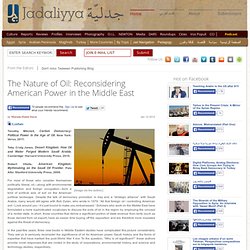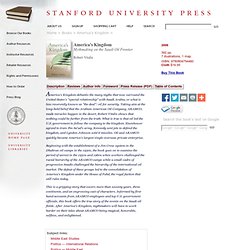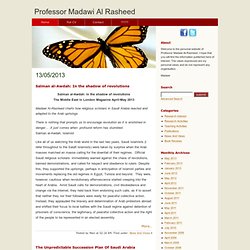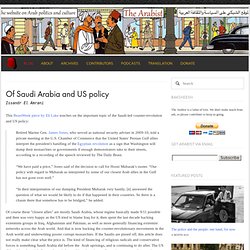

The Nature of Oil: Reconsidering American Power in the Middle East. Timothy Mitchell, Carbon Democracy: Political Power in the Age of Oil.

New York: Verso, 2011. Toby Craig Jones, Desert Kingdom: How Oil and Water Forged Modern Saudi Arabia. Cambridge: Harvard University Press, 2010. Robert Vitalis, American Kingdom: Mythmaking on the Saudi Oil Frontier. Palo Alto: Stanford University Press, 2006. For most of those who consider themselves politically liberal, oil—along with environmental degradation and foreign occupation—form a kind of political axis of evil on the American political landscape. In the past few years, three new books in Middle Eastern studies have complicated this picture considerably. Robert Vitalis’ American Kingdom: Mythmaking on the Saudi Oil Frontier effectively destroys the notion that ARAMCO represented a benevolent corporation committed to the “social uplift” of its employees.
Of the three books, Timothy Mitchell’s Carbon Democracy: Political Power in the Age of Oil makes the most far-reaching claims for the importance of oil. America's Kingdom: Mythmaking on the Saudi Oil Frontier - Robert Vitalis. "America's Kingdom comes as a pleasant surprise... a scholarly and readable book on the interaction between Saudi society and Aramco, the US oil giant that had its beginnings when the Saudi government granted its first concessions to Standard Oil of California in 1933.

Combining history with political anthropology, Vitalis sheds a bright light on the origins and less savory aspects of the Saudi-US relationship. "—London Review of Books "If good historiography is about unveiling hidden connections, then America's Kingdom must stand among the best that the discipline has to offer... The book presents a wealth of previously unknown facts and anecdotes, is written more wittily than any other Saudi-related book, and is meticulously referenced, drawing on sources from eight different (American) archives.
"—Business History Review "Groundbreaking is a word too often used in assessing historical scholarship. "Rich, marvelously researched, and densely argued... From Arab Nationalism to OPEC. Professor Madawi Al Rasheed. Salman al-Awdah: In the shadow of revolutions The Middle East in London Magazine April-May 2013 Madawi Al-Rasheed charts how religious scholars in Saudi Arabia reacted and adapted to the Arab uprisings There is nothing that prompts us to encourage revolution as it is enshrined in danger... .It just comes when profound reform has stumbled.

Salman al-Awdah, Islamist Like all of us watching the Arab world in the last two years, Saudi Islamists (I refer throughout to the Salafi Islamists) were taken by surprise when the Arab masses marched en masse calling for the downfall of their regimes. Official Saudi religious scholars immediately warned against the chaos of revolutions, banned demonstrations, and called for respect and obedience to rulers. Posted by Main at 02:24 AM. Source: Saudi Arabia is neither an island of tranquility in a turbulent Arab sea nor a country on the verge of revolution. Of Saudi Arabia and US policy. This BeastWeek piece by Eli Lake touches on the important topic of the Saudi-led counter-revolution and US policy: Retired Marine Gen.

James Jones, who served as national security adviser in 2009-10, told a private meeting at the U.S. Chamber of Commerce that the United States' Persian Gulf allies interpret the president's handling of the Egyptian revolution as a sign that Washington will dump their monarchies or governments if enough demonstrators take to their streets, according to a recording of the speech reviewed by The Daily Beast. “We have paid a price,” Jones said of the decision to call for Hosni Mubarak's ouster. “Our policy with regard to Mubarak as interpreted by some of our closest Arab allies in the Gulf has not gone over well.”
Another point of debate is whether the US "dumping" Mubarak had an impact on the outcome of the January uprising. Ya think? US Saudi Relations - A Deadly triangle? U.S. - Saudi.